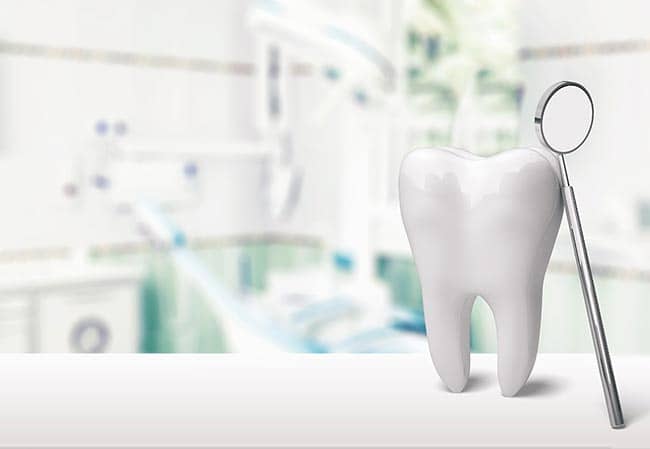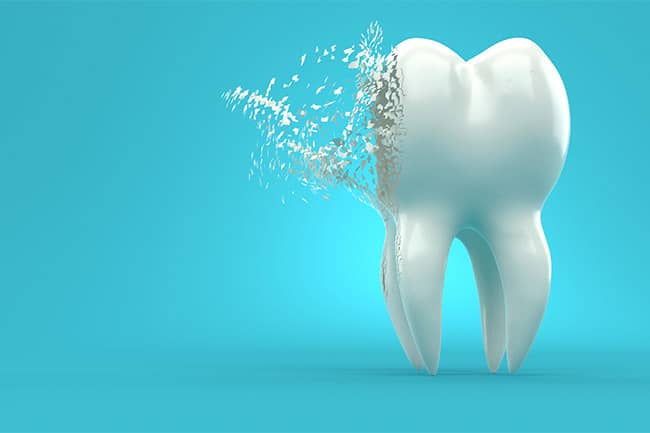Did you know that our teeth have a thin outer protective covering called the enamel, which is considered to be the hardest part of the human body? Yet even the strongest enamel can’t withstand unwanted accidents and the occasional human silliness, so we can sometimes end up with a chipped, cracked or broken tooth.
A chip in a tooth may not sound seriously alarming, but it’s the pain, soreness and sensitivity we feel that we should be worried about. It’s also what’s beyond the chip or crack that we can’t see that may need some attention.

First Aid and At-Home Treatments
If you chip or crack a tooth, warm salt water mouth rinsing and over the counter analgesics (paracetamol or ibuprofen) to relieve any pain is the ideal first aid remedy. You may also apply pressure to stop any bleeding and a cold compress outside the affected area to prevent swelling. More serious cases, caused by accidents for example, that involve excessive bleeding and uncontrollable pain should be treated as a dental emergency. All trauma to the teeth should be assessed by a dental practitioner as soon as practical.
There are also over-the-counter temporary tooth repair kits that you can get from your local chemist. Dental wax can be applied to cover uneven rough edges that could hurt your tongue and other parts of your mouth.
However, at-home remedies will only assist in reducing the symptoms but will not address the real damage to the tooth as well as to its inner and surrounding areas. Chips and cracks may lead to infection and eventually tooth loss if not properly treated. You should see your dental professional as soon as possible for a thorough check-up and the best possible treatment.
Dental Repairs and Treatments for a Chipped Tooth
There are different ways to treat a chipped tooth depending on its severity. Your dentist and oral health therapist may actually recommend not doing anything at all if your tooth displays a superficial crack on its enamel.
However, if you do need dental repair, here are treatments that may be recommended on a case-by-case basis:
Composite veneers or dental bonding
For a minor chip on your tooth, composite bonding could be the simplest solution. This involves covering the chip on your tooth with a resin material, the colour of which will be chosen by your dentist and oral health therapist to match the colour of other surrounding teeth. The resin is then hardened using a laser or ultra-violet light, trimmed and polished until it looks like your natural tooth again.
Dental crowns
For larger chips or the presence of major tooth decay, your dentist may recommend the use of a dental crown, a tooth-shaped like jacket made of either porcelain or zirconia that strengthens the tooth. The remaining part of the tooth will be filed and shaped appropriately, then your dentist will create a mould of your tooth to create the crown. A temporary one is put on and you’ll have to go back for another visit when your crown is ready to be bonded on your tooth.
Root canal treatment
Sometimes a tooth chip or crack is too severe that it exposes the pulp – the inner core of your tooth housing its complex blood and nerve system. If left untreated, bacteria may enter, infect and damage the pulp of your tooth. Damaged pulp will cause a lot of pain. If your dentist finds this to be the case, a root canal treatment may be the best solution. This involves removing the pulp, cleaning the hole that this creates, placing a filling inside the hole, inserting any support if required and capping the tooth with a crown.
Tooth extraction
In extreme cases where there’s no salvaging the tooth or any part of it, the only solution may be tooth extraction. Your dentist may then recommend using implants in future to replace the tooth.
Seek Help From Your Dental Professional
No matter how simple or severe the case may be, seeking professional help from a dental practitioner is important when it comes to chipped teeth. Even a simple crack allows bacteria to slowly enter into the pulp and over time will weaken your tooth. Only your dentist and oral health therapist can thoroughly assess the damage and prevent it from causing more serious problems in future.





I was relieved to see that sometimes, a chipped tooth does not need any treatment and if it does, it could be as simple as composite bonding. I chipped my tooth yesterday on a piece of hard candy. It seems superficial, however, I will visit a dental professional to make sure.